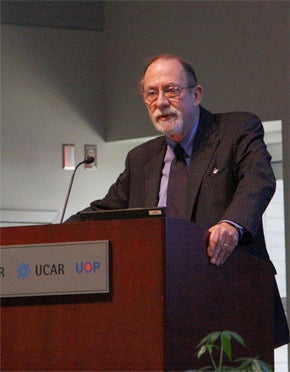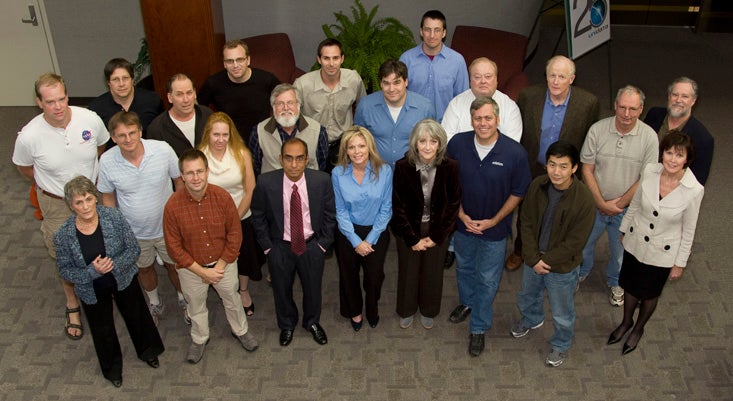Unidata turns 25
A sterling group toasts the program's 25th anniversary
Jan 15, 2010 - by Staff
Jan 15, 2010 - by Staff
3 December 2009 • UCAR's first community program-Unidata-celebrated its 25th anniversary on 15-16 October with a rare gathering of staff, founders, partners, and collaborators from around the country. Close to 100 attendees, including many of the people most closely involved with Unidata's birth and growth, celebrated the program's accomplishments and looked ahead to the future.
 John Dutton (Pennsylvania State University) recounts Unidata's founding.
John Dutton (Pennsylvania State University) recounts Unidata's founding.
The roots of Unidata extend back to 1977, when the National Weather Service decided to drop the free teletype and facsimile circuits that fed weather data to university meteorology departments in those pre-Internet days. The decision was a "bombshell," said former UCAR trustee John Dutton, also an emeritus dean at Pennsylvania State University. After years of debate, university faculty called on UCAR in 1982 to develop a solution that could provide departments with affordable data.
More than 80 people at a workshop in Madison the next summer asked UCAR to organize an NSF-funded system to be dubbed Unidata (a name coined by Dutton). It was officially launched in 1984 with Dutton and the late Vernon Suomi as principal investigators. UCAR would be the host institution, and NSF would be the funder. "When the need for Unidata arose, both organizations were prepared to act," said Dutton.
At first, it wasn't clear how Unidata would arrange for digital communication, but the emphasis gradually shifted from satellite and phone transmission to the Internet as the latter strengthened. Other early debates centered on whether Unidata should provide software, how much support NSF should provide, and whether a private for-profit firm should supply the data.
Over the years, Unidata has grown from about 240 individual participants to more than 1,500 academic institutions and 7,000 organizations today, broadening geographically to include universities, labs, private sector companies, and institutions from around the world. The program has also expanded from a focus on synoptic and mesoscale meteorology alone to an emphasis on Earth system science and other geoscience fields, providing analysis tools and user support as well as data access. Unidata's Network Common Data Form (netCDF) is widely used both nationally and internationally in more than 100 countries. The program's core funding is extended through peer-reviewed proposals submitted every five years to NSF, the most recent of which occurred in December 2008.
"The entry barrier has been lowered for undergraduate students who want to get involved with research," said Gary Lackmann (North Carolina State University), the outgoing chair of Unidata's Users Committee. Lackmann noted that many journal articles are based on research involving Unidata-produced tools, even if the program isn't acknowledged in the paper itself.
 On hand for the Unidata celebration were (left to right) keynote speaker Perry Samson (University of Michigan), founding director David Fulker—part of a jazz combo at the reception—and Donald Johnson (University of Wisconsin-Madison), who was instrumental in Unidata's founding.
On hand for the Unidata celebration were (left to right) keynote speaker Perry Samson (University of Michigan), founding director David Fulker—part of a jazz combo at the reception—and Donald Johnson (University of Wisconsin-Madison), who was instrumental in Unidata's founding.
Drawing on his 18 years as founding director, David Fulker (now Unidata director emeritus and an adviser in UCAR Community Programs) explored lessons learned from Unidata as an "experiment in collaboration." He noted that, from the start, the program was conceptually distributed; for example, Unidata has never operated its own data center, but instead has largely relied on the academic community to relay data from diverse sources using its Internet Data Distribution network. It has maintained a deep sense of community ownership, combined with strong leadership and patient support from NSF, and has managed to balance long-term development with immediate user support.
"If there was a Unidata mantra in my time," said Fulker, "it might have been: Don't do anything centrally that the universities themselves can do well."
Unidata's current director, Mohan Ramamurthy, joined the users committee in 1989 while teaching at the University of Illinois at Urbana-Champaign. "I've seen so many wonderful things take place in the community because of Unidata's work," said Ramamurthy. In his closing remarks, he summarized Unidata's strategic outlook and his vision for end-to-end data services, which takes into account ever-growing demands on Unidata services, the meteoric rise of Web-based applications, and an impending deluge of data from new NOAA radar and satellite systems slated for the 2010s. The program also plans to develop a new set of case studies that would include a dynamic collection of datasets of weather events and, where appropriate, relevant educational modules and related materials.
As always, Unidata will call on its university colleagues to help steer its path. One primary strategy, said Ramamurthy, is to engage the community so that members are not only participants but also contributors to and drivers of the enterprise. "NSF's sustained investment has made the program a cornerstone data resource for the atmospheric science community. Other disciplines like hydrology would dearly love to have a facility like Unidata for their community."
 Unidata's Boulder staff staff: (front row, left to right) Jo Hansen, Don Murray, Mohan Ramamurthy, Tina Campbell, Ginger Emery, Jeff Weber, Yuan Ho, and Linda Miller; (middle row) Jeff McWhirter, Jennifer Oxelson, Tom Yoksas, Brian Kelly, Dennis Heimbigner, Russ Rew, Robb Kambic, and Steve Emmerson; (third row) Ed Hartnett, Mike Schmidt, John Caron, Michael James, Terry Mitchell, and Ethan Davis.Unidata's Boulder staff staff: (front row, left to right) Jo Hansen, Don Murray, Mohan Ramamurthy, Tina Campbell, Ginger Emery, Jeff Weber, Yuan Ho, and Linda Miller; (middle row) Jeff McWhirter, Jennifer Oxelson, Tom Yoksas, Brian Kelly, Dennis Heimbigner, Russ Rew, Robb Kambic, and Steve Emmerson; (third row) Ed Hartnett, Mike Schmidt, John Caron, Michael James, Terry Mitchell, and Ethan Davis. Not pictured: Ben Domenico.
Unidata's Boulder staff staff: (front row, left to right) Jo Hansen, Don Murray, Mohan Ramamurthy, Tina Campbell, Ginger Emery, Jeff Weber, Yuan Ho, and Linda Miller; (middle row) Jeff McWhirter, Jennifer Oxelson, Tom Yoksas, Brian Kelly, Dennis Heimbigner, Russ Rew, Robb Kambic, and Steve Emmerson; (third row) Ed Hartnett, Mike Schmidt, John Caron, Michael James, Terry Mitchell, and Ethan Davis.Unidata's Boulder staff staff: (front row, left to right) Jo Hansen, Don Murray, Mohan Ramamurthy, Tina Campbell, Ginger Emery, Jeff Weber, Yuan Ho, and Linda Miller; (middle row) Jeff McWhirter, Jennifer Oxelson, Tom Yoksas, Brian Kelly, Dennis Heimbigner, Russ Rew, Robb Kambic, and Steve Emmerson; (third row) Ed Hartnett, Mike Schmidt, John Caron, Michael James, Terry Mitchell, and Ethan Davis. Not pictured: Ben Domenico.